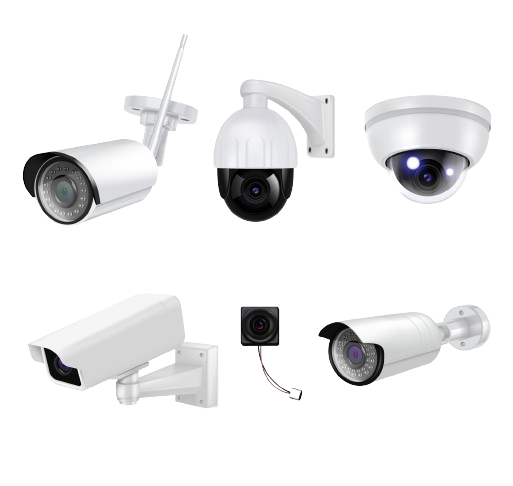
CCTV cameras
In an era where security is paramount, CCTV cameras have become an integral part of safeguarding homes and businesses across the USA and Europe. These surveillance systems offer peace of mind by providing round-the-clock monitoring, deterring potential intruders, and aiding in the investigation of incidents. Whether you’re considering installing your first CCTV system or upgrading an existing one, this user-friendly guide will walk you through everything you need to know about CCTV cameras and their role in modern security solutions.
1. What is CCTV?
CCTV, which stands for Closed-Circuit Television, refers to a system in which video cameras transmit signals to a specific set of monitors for surveillance and security purposes. These cameras are strategically placed to capture footage of designated areas, both indoors and outdoors.
2. Types of CCTV Cameras
a. Surveillance Cameras: These are the most common type of CCTV cameras used for general monitoring purposes. They come in various designs, including dome, bullet, and PTZ (Pan-Tilt-Zoom) cameras, offering different functionalities and mounting options.
b. Home Security Cameras: Specifically designed for residential use, home security cameras are compact, easy to install, and often equipped with features like motion detection and night vision.
c. Wireless Security Cameras: As the name suggests, wireless security cameras operate without the need for cumbersome wiring, making them ideal for easy installation and flexible placement.
d. Outdoor Security Cameras: Built to withstand harsh weather conditions, outdoor security cameras are designed to monitor the exterior of buildings and properties, providing enhanced security against trespassers and intruders.
e. Indoor Security Cameras: These cameras are tailored for indoor surveillance, such as monitoring entryways, living areas, or valuable possessions within a home or office environment.
f. 4K Security Cameras: Offering ultra-high-definition resolution, 4K security cameras deliver crystal-clear footage with exceptional detail, making them ideal for applications where image clarity is crucial.
g. Hidden Security Cameras: Also known as covert cameras, hidden security cameras are discreetly disguised within everyday objects or fixtures, providing covert surveillance without drawing attention.
h. IP Security Cameras: IP (Internet Protocol) cameras transmit video data over an internet network, enabling remote access and management via smartphones, tablets, or computers.
3. Benefits of CCTV Systems
a. Deterrence: The mere presence of CCTV cameras acts as a deterrent to potential criminals, reducing the likelihood of unauthorized access or criminal activity.
b. Evidence Collection: In the event of an incident, CCTV footage serves as valuable evidence for law enforcement and insurance purposes, aiding in the identification and prosecution of perpetrators.
c. Remote Monitoring: With advancements in technology, many CCTV systems offer remote monitoring capabilities, allowing users to view live footage and receive alerts on their mobile devices from anywhere with an internet connection.
d. Peace of Mind: Whether you’re at home or away, knowing that your property is under constant surveillance provides peace of mind and a sense of security for you and your family.
e. Integration with Home Automation: Some CCTV systems can be integrated with home automation platforms, allowing users to automate tasks such as turning on lights or locking doors based on motion detection or specific triggers.
4. Factors to Consider Before Installing CCTV
a. Placement: Proper placement of CCTV cameras is essential to maximize coverage and effectiveness. Consider areas of vulnerability and potential blind spots when determining camera placement.
b. Resolution: Higher resolution cameras offer clearer images, making it easier to identify faces, license plates, or other details crucial for investigation purposes.
c. Night Vision: If monitoring during nighttime hours is necessary, opt for cameras equipped with infrared LEDs or low-light sensitivity for enhanced visibility in dark conditions.
d. Storage: Decide whether you prefer local storage via a DVR (Digital Video Recorder) or NVR (Network Video Recorder) or cloud-based storage for your CCTV footage.
e. Budget: Determine your budget and prioritize features based on your specific security needs and preferences.
5. Installation and Maintenance
a. DIY vs. Professional Installation: While some CCTV systems are designed for DIY installation, complex setups may require professional installation to ensure optimal performance and functionality.
b. Regular Maintenance: Proper maintenance, including cleaning lenses, checking connections, and updating firmware, is crucial to ensure your CCTV system operates effectively and reliably over time.
c. Firmware Updates: Stay informed about firmware updates released by the manufacturer to address security vulnerabilities and improve system performance.
6. Legal Considerations
a. Privacy Laws: Familiarize yourself with local laws and regulations governing the use of CCTV cameras, especially regarding privacy concerns and restrictions on recording audio or video in certain areas.
b. Data Protection: Safeguard recorded footage and personal data in compliance with data protection laws, such as the General Data Protection Regulation (GDPR) in Europe or the California Consumer Privacy Act (CCPA) in the USA.
7. Conclusion
CCTV cameras play a vital role in modern security solutions, offering enhanced protection and peace of mind for homeowners and businesses alike. By understanding the different types of CCTV cameras, their benefits, installation considerations, and legal implications, you can make informed decisions when implementing a CCTV system tailored to your specific security needs. Remember, investing in a reliable CCTV system is an investment in the safety and security of your loved ones and your property.
In conclusion, whether you’re looking to enhance home security, monitor your business premises, or simply gain peace of mind, CCTV cameras are a versatile and effective solution for all your surveillance needs. By choosing the right type of camera, considering key factors such as resolution and night vision, and adhering to legal regulations, you can create a comprehensive CCTV system that provides round-the-clock protection for your property. So, take the first step towards a safer and more secure environment by investing in a CCTV system today!
Disclaimer: This article is for informational purposes only and does not constitute legal or professional advice. Readers are encouraged to consult with relevant authorities or security experts for specific guidance on CCTV installation and compliance with local laws and regulations





